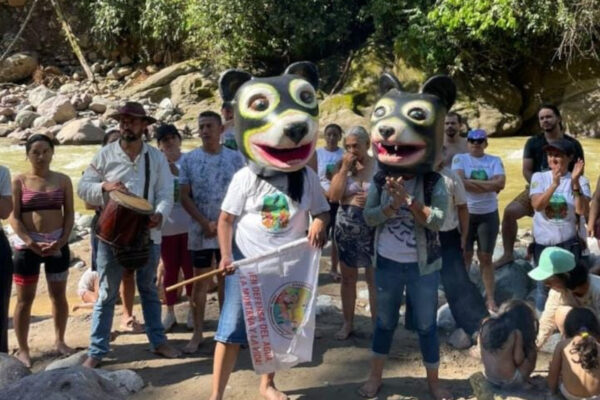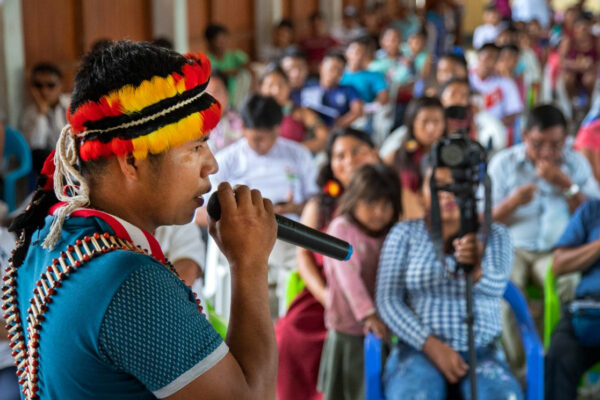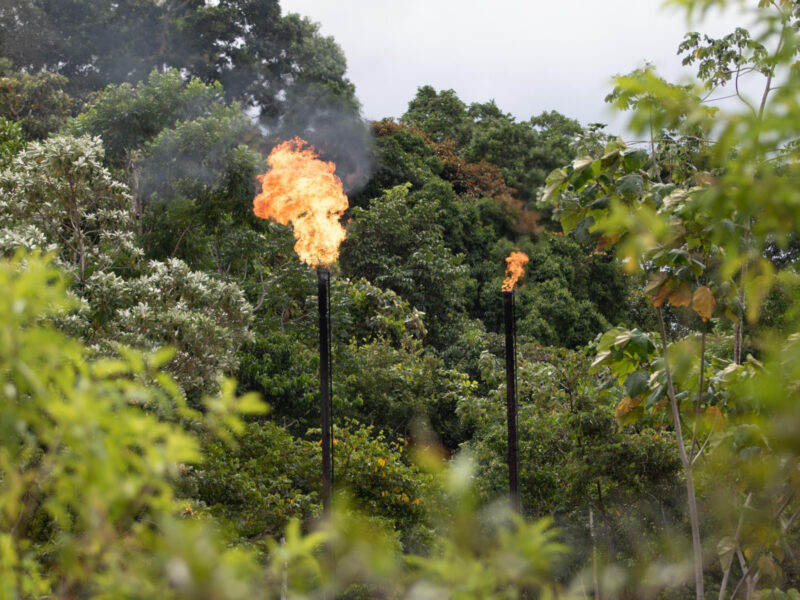Download In the Shadows of the State report
Bogota/Quito/Lima – Amazon Watch and Amazon Underworld called on Amazon Basin governments to move beyond declarations and commit to meaningful implementation of their stated commitments after last week’s Presidential Summit of the Amazon Cooperation Treaty Organization (ATCO). While leaders advanced Indigenous co-governance and cooperation against transnational crime, the Declaration of Bogotá requires concrete actions to become an effective response against the grave security crisis which threatens the Amazon and its inhabitants. The coming months offer a crucial window of opportunity.
The summit approved the Amazonian Indigenous Peoples Mechanism (MAPI) – a parity co-presidency body between governments and Indigenous representatives – and reaffirmed support for ATCO’s Special Commission on Public Security and Transboundary/Transnational Illicit Activities, as well as technical cooperation on gold/mercury traceability. Only three of eight presidents attended, underscoring the need for swift, practical coordination that includes Indigenous authorities and local communities.
The ongoing crisis of violence, crime, environmental impacts and human rights violations in the Amazon, was one of the key topics at the Summit. Colombian President Petro stated: “The main enemy of the Amazon, after global warming, is drug trafficking. And we must unite to fight it, because we are getting ever closer to the tipping point of the Amazon. As a region we must work to avoid crossing that threshold. As I have always said: the security of the forest is the security of humanity,” said Petro during the meeting he held with the other presidents and the foreign ministers of the eight ATCO member countries.
New research by Amazon Watch and Amazon Underworld, In the Shadows of the State, shows the impact of illicit economies and armed group control on one of the most biodiverse tropical rainforest regions, and its communities. The report documents how armed groups, including the Comandos de la Frontera (CDF) and FARC dissidents, and Ecuadorian crime groups such as Los Choneros and Los Lobos exercise criminal governance in the tri-border: imposing curfews and “taxes,” controlling mobility and commerce, forcibly recruiting minors, and promoting illegal mining that contaminates rivers with mercury. Militarized responses without governance reform have exacerbated displacement, abuses, and environmental destruction.
“The summit’s security language and MAPI’s creation can be useful tools to contain the expansion of organized crime in the Amazon, if it leads to the implementation of a security strategy that backs community based territorial governance and economic alternatives,” said Raphael Hoetmer, Western Amazon Program Director at Amazon Watch. “The tri-border must be the test case: protect defenders, dismantle illicit economies, and pair enforcement with peacebuilding and restoration.”
“In over half a dozen field visits and more than 70 interviews, we documented how criminal networks began to dominate daily life and govern in extensive territories with little to no state presence.,” said Bram Ebus, founder of Amazon Underworld. “With the Bogotá Declaration, regional cooperation has a framework. Now governments need to operationalize it across borders – intelligence-sharing, joint investigations and tackling illicit money flows. Public security strategies should be redesigned with Amazon communities at the table.”
Security takeaways from the ACTO summit
- Indigenous co-governance approved: MAPI gives Indigenous peoples a formal voice and vote within ATCO; first session expected at COP30 (Belém, November 2025). Implementation is the test.
- Regional security cooperation reaffirmed: The Declaration backs the Special Commission on Public Security and Transboundary Illicit Activities to strengthen police/judicial/intelligence cooperation against environmental crime and attacks on defenders.
- Traceability commitments: Members pledged information-sharing and technical cooperation on gold and mercury traceability to curb illegal mining.
Background linkages
Many of these strands build on the Belém Declaration (2023), which tasked ACTO to reactivate special commissions (including for public security) and convene ministerial-level cooperation against transnational organized crime.
Why the tri-border must be first
In the Shadows of the State provides a clear current diagnostic of the Amazon Basin’s most acute security crisis. Armed groups in Putumayo–Sucumbíos-Orellana–Loreto hold effective territorial control, levy illegal “taxes,” and regulate daily life; illegal mining and trafficking corridors move chemicals for cocaine production, gold, weapons, fuel – and violence – across rivers and borders. The report concludes that enforcement alone fails without territorial governance, protection of defenders, and blacking ilicit financial flows.
Quotes
Bram Ebus, Amazon Underworld: “The tri-border has become a hub for organized crime and drug trafficking, but for this very reason, it could also become a laboratory for peacebuilding and drug policy. Only if the governments of Colombia, Ecuador, and Peru replicate what organized crime has long mastered – cross-border cooperation – will it be possible to reverse the dynamics of violence and environmental destruction.”
Raphael Hoetmer, Amazon Watch: “We stand at a tipping point. Without a decisive shift toward a security strategy rooted in cross-border cooperation, community leadership, and tackling the structural causes of violence, criminal governance in the tri-border will deepen and spread into Ecuador and Peru. Peace and security in the Amazon are impossible without Indigenous peoples at the heart of the solution. The coming months will be crucial: a first specific meeting between governments and Amazonian communities should happen in the coming months to discuss the security crisis.”
About the report
In the Shadows of the State draws on eight field visits between November 2024 and July 2025 and 70+ confidential interviews with Indigenous leaders, social organizations, ex-combatants, armed group members, public officials, journalists, prosecutors, environmental defenders, and international observers. It documents parallel criminal governance, human rights violations, environmental destruction, and the failure of militarized approaches without an integral statebuilding approach.
Core recommendations
- Implement a regional security strategy with a territorial and environmental focus, led by ATCO, with direct participation of Amazonian communities, Indigenous leaders, and grassroots organizations. A permanent mechanism for dialogue between communities and governments is required for this.
- Strengthen protection mechanisms for environmental defenders, promoting Indigenous justice systems and recognition of territorial guards.
- Advance gradual substitution of illicit crops, with real public investment, land titling, and access to offset markets.
- Incorporate urgent ecological restoration actions and cleanup of contaminated rivers, in coordination with environmental prosecutors and multilateral organizations.
- Strengthen commitments for peace negotiations with the Coordinadora Ejército Bolivariano with human rights guarantees and international verification, involving Ecuador and Peru.
- Enhance law enforcement cooperation prioritizing illicit money flows.
Background
Amazon Underworld is an investigative journalism project that focuses on organized crime, illegal economies, and armed conflict in the Amazon Basin. It conducts in-depth field research, often in high-risk and remote areas, to expose the networks and dynamics driving violence, environmental destruction, and social harm. By documenting these realities, Amazon Underworld seeks to inform public debate, influence policy, and amplify the voices of affected communities.
Amazon Watch is a nonprofit organization that works to protect the rainforest and advance the rights of Indigenous peoples across the Amazon Basin. Founded in 1996, it partners directly with Indigenous and environmental organizations to confront deforestation, climate change, and human rights abuses. Through advocacy, campaigns, and international pressure, Amazon Watch aims to hold governments and corporations accountable while supporting local-led solutions.














